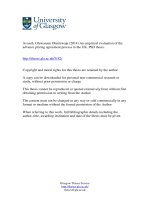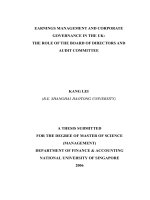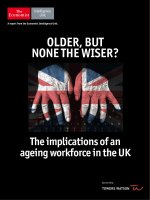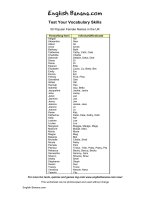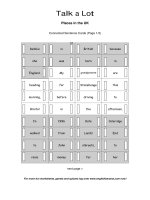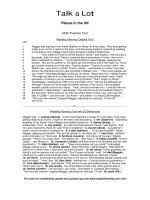places in the uk discussion words question sheet
Bạn đang xem bản rút gọn của tài liệu. Xem và tải ngay bản đầy đủ của tài liệu tại đây (88.57 KB, 4 trang )
Talk a Lot
Places in the UK
General Questions
1. Are there any places that you don’t know? Find out more about them.
2. Take some cards. Describe the place on a card without saying it.
3. How many places have… a) 1 syllable, b) 2 syllables, c) 3 syllables, d) 4 syllables,
e) 5 syllables, f) 6 syllables?
4. Put places with more than one syllable into groups according to where the strong
stress falls.
5. Put the places into alphabetical order.
6. Put together places that have the same number of letters.
7. Find places that… a) begin with a vowel sound, b) end with a vowel sound, c) begin
with a consonant sound, d) end with a consonant sound. Put them into sound groups.
8. Find places which contain silent letters (letters which are not pronounced).
9. How many places can you remember when they are all turned over?
10. Put places that contain the same sounds into groups, using the IPA.
Lesson Questions
1. Which place sounds like… a) porridge, b) sales, c) pistol, d) banned send, e) path?
2. a) Find all of the countries in the UK and put them together with their capital cities.
b) Which of these countries form Great Britain?
3. Which place is a homophone with a group of the largest sea mammals?
4. Find a place where you can… a) watch a match, b) hunt a monster, c) check the time.
5. Find a place which has a weak stress schwa sound L]L on the… a) 1st syllable,
b) 2nd syllable, c) 3rd syllable, etc. ii) Do any places not have a schwa?
6. Put the countries of the UK into order of size, from the one with the biggest population
to the one with the smallest. (Have a guess, if you’re not sure!)
7. Put into groups all of the… a) cities, b) tourist attractions, c) places of cultural interest,
d) places of outstanding natural beauty, e) historical sites.
8. Put into groups all of the places in… a) Wales, b) Scotland, c) Northern Ireland,
d) England.
9. Find… a) a monument, b) a street, c) a village, d) a theme park, e) a suburb,
f) a country, g) a border, h) a seaside resort, i) an archipelago, j) a mountain range.
For more fun worksheets, games and quizzes log onto www.englishbanana.com now!
Talk a Lot
Places in the UK
Discussion Words Question Sheet
Answers
General Questions
1. Answers will vary.
2. Answers will vary.
3. a) 2 places have 1 syllable: Wales, York. b) 17 places have 2 syllables: Land’s End, Scotland, Oxford, Norwich,
Brick Lane, Bristol, England, Cardiff, Bournemouth, London, Stonehenge, Greenwich, Orkney, Cambridge, Belfast,
Loch Ness, Skegness. c) 13 places have 3 syllables: Hadrian’s Wall, Giant’s Causeway, Clumber Park, Manchester,
Llandudno, Hathersage, Wimbledon, Aberdeen, Norfolk Broads, John o’Groats, Great Britain, Lake District,
Edinburgh. d) 6 places have 4 syllables: Northern Ireland, English Channel, Alton Towers, Sherwood Forest,
Cardigan Bay, Snowdonia. e) 1 place has 5 syllables: United Kingdom. f) 1 place has 6 syllables: Stratford-uponAvon.
4. 2 syllables: these places have the strong stress on the first syllable: Belfast, Oxford, Norwich, Bristol, England,
Cardiff, Bournemouth, London, Greenwich, Orkney, Cambridge, Scotland; these places have the strong stress on
the second syllable: Land’s End, Brick Lane, Stonehenge, Loch Ness, Skegness. 3 syllables: these places have the
strong stress on the first syllable: Manchester, Hathersage, Wimbledon, Lake District, Edinburgh; these places have
the strong stress on the middle syllable: Giant’s Causeway, Great Britain, Llandudno; these places have the strong
stress on the third syllable: Hadrian’s Wall, John o’Groats, Aberdeen, Norfolk Broads, Clumber Park. 4 syllables:
this place has the strong stress on the second syllable: Snowdonia; these places have the strong stress on the third
syllable: Northern Ireland, English Channel, Alton Towers, Sherwood Forest; this place has the strong stress on the
fourth syllable: Cardigan Bay. 5 syllables: this place has the strong stress on the fourth syllable: United Kingdom.
6 syllables: this place has the strong stress on the fifth syllable: Stratford-upon-Avon.
5. Aberdeen, Alton Towers, Belfast, Bournemouth, Brick Lane, Bristol, Cambridge, Cardiff, Cardigan Bay, Clumber
Park, Edinburgh, England, English Channel, Giant’s Causeway, Great Britain, Greenwich, Hadrian’s Wall,
Hathersage, John o’Groats, Lake District, Land’s End, Llandudno, Loch Ness, London, Manchester, Norfolk Broads,
Northern Ireland, Norwich, Orkney, Oxford, Scotland, Sherwood Forest, Skegness, Snowdonia, Stonehenge,
Stratford-upon-Avon, United Kingdom, Wales, Wimbledon, York.
6. 4 letters: York. 5 letters: Wales. 6 letters: London, Orkney, Oxford. 7 letters: Belfast, Bristol, Cardiff, England,
Norwich. 8 letters: Aberdeen, Land’s End, Loch Ness, Scotland, Skegness. 9 letters: Brick Lane, Cambridge,
Edinburgh, Greenwich, Llandudno, Snowdonia, Wimbledon. 10 letters: Hathersage, Manchester, Stonehenge.
11 letters: Alton Towers, Bournemouth, Cardigan Bay, Clumber Park, John o’Groats. 12 letters: Great Britain,
Hadrian’s Wall, Lake District. 13 letters: Norfolk Broads, United Kingdom. 14 letters: English Channel, Giant’s
Causeway, Sherwood Forest. 15 letters: Northern Ireland. 17 letters: Stratford-upon-Avon.
7. a) These places all begin with a vowel sound (grouped by IPA sound): LfL English Channel, England; LflL Alton
Towers, Oxford; LlWL Orkney; LôL Aberdeen; LÉL Edinburgh.
b) These places all end with a vowel sound (grouped by IPA sound): L]L Edinburgh, Manchester, Snowdonia;
LÉfL Cardigan Bay, Giant’s Causeway; L]rL Llandudno; LáL Orkney.
c) These places all begin with a consonant sound (grouped by IPA sound): LëL Snowdonia, Skegness, Scotland,
Stonehenge, Stratford-upon-Avon; LâL Cardiff, Cardigan Bay, Cambridge, Clumber Park; LäL London, Lake District,
Loch Ness, Land’s End; LÄL Brick Lane, Bristol, Bournemouth, Belfast; LåL Norwich, Norfolk Broads, Northern Ireland;
LÇwL Giant’s Causeway, John o’Groats; LÜL Hathersage, Hadrian’s Wall; LàL York, United Kingdom;
LïL Wimbledon, Wales; LÖL Greenwich, Great Britain; LãL Manchester; LÜL Llandudno; LpL Sherwood Forest.
d) These places all end with a consonant sound (grouped by IPA sound): LåL Wimbledon, Brick Lane, Aberdeen,
London, Great Britain, Stratford-upon-Avon; LÇL Scotland, Oxford, England, Northern Ireland, Land’s End; LòL Norfolk
Broads, Alton Towers, John o’Groats, Wales; LÇwL Hathersage, Stonehenge, Cambridge; LäL Hadrian’s Wall, English
Channel, Bristol; LíL Sherwood Forest, Belfast, Lake District; LëL Skegness, Loch Ness; LâL York, Clumber Park;
LípL Norwich, Greenwich; LãL United Kingdom; LqL Bournemouth; LÑL Cardiff.
8. Many English words contain one or more silent letters – letters which are part of the spelling of a word, but which
are not pronounced. The aim of this activity is to demonstrate how so often the spelling of a word in English is
For more fun worksheets, games and quizzes log onto www.englishbanana.com now!
Talk a Lot
Places in the UK
Discussion Words Question Sheet
different from how it sounds when spoken. Below are some good examples of words in this group of discussion
words that have silent letters. The silent letters are shown in brackets. No doubt your students will be able to identify
some more.
Green [w] ich, Cambridg [e], Edinbur [gh], Nor [w] ich, Cardif [f], Bourn [e] mouth, Orkne [y]
9. Answers will vary.
10. There are many possible answers to this question; for example, “Scotland”, “Oxford”, “Alton Towers”, “Loch
Ness” and “Norwich” all contain the vowel sound LflL. Use the phonetic chart on p.18.6 of the Talk a Lot Elementary
Handbook (available free from www.englishbanana.com/talkalot) and the phonetic spellings of the vocabulary words
on the Discussion Words (with the IPA) handout to help your students put the places into sound groups.
Lesson Questions
1. a) Norwich. b) Wales. c) Bristol. d) Land’s End. e) Bath.
2. The countries that form the UK are (with their capital cities): England (London), Scotland (Edinburgh),
Northern Ireland (Belfast), and Wales (Cardiff).
3. Wales is a homophone with whales – both words sound alike, but have different spellings and meanings.
4. a) Wimbledon. b) Loch Ness. c) Greenwich.
st
5. i) a) Places which have a weak stress schwa sound L]L on the 1 syllable: none. b) Places which have a weak
nd
stress schwa sound L]L on the 2 syllable: Wimbledon, Alton Towers, Bournemouth, Bristol, Clumber Park,
England, Hathersage, John o’Groats, London, Norfolk Broads, Northern Ireland, Oxford, Scotland, Sherwood Forest,
rd
Stratford-upon-Avon, Aberdeen. c) Places which have a weak stress schwa sound L]L on the 3 syllable: Cardigan
Bay, Edinburgh, Great Britain, Manchester, Stratford-upon-Avon, United Kingdom, Wimbledon. d) Places which have
th
a weak stress schwa sound L]L on the 4 syllable: Snowdonia, English Channel, Alton Towers, Sherwood Forest,
th
Northern Ireland. e) One place has a weak stress schwa sound L]L on the 5 syllable: United Kingdom. f) One place
th
has a weak stress schwa sound L]L on the 6 syllable: Stratford-upon-Avon. ii) 17 places don’t have a weak stress
schwa sound: Belfast, Brick Lane, Cambridge, Cardiff, Giant’s Causeway, Greenwich, Hadrian’s Wall, Lake District,
Land’s End, Llandudno, Loch Ness, Norwich, Orkney, Skegness, Stonehenge, Wales, York.
6. England (population: 51 million), Scotland (5.2m), Wales (3m), and Northern Ireland (1.8m).
7. Answers may vary. Suggested answers:
a) The cities are: Belfast, Oxford, Manchester, York, Norwich, Aberdeen, Bristol, Cardiff, Bournemouth, London,
Cambridge, and Edinburgh.
b) The tourist attractions are: Giant’s Causeway, Alton Towers, Norfolk Broads, Stonehenge, Sherwood Forest,
Loch Ness, John o’Groats, Skegness, Land’s End, Stratford-upon-Avon, and Hadrian’s Wall.
c) The places of cultural interest are: York, Stonehenge, Brick Lane, Greenwich, Stratford-upon-Avon, Oxford, and
Cambridge.
d) The places of outstanding natural beauty are: Loch Ness, Giant’s Causeway, Norfolk Broads, Sherwood Forest,
Orkney, Cardigan Bay, Lake District, Clumber Park, and Snowdonia.
e) The historical sites are: Stratford-upon-Avon, Hadrian’s Wall, Stonehenge, and York.
8. a) The places in Wales are: Cardiff, Cardigan Bay, Llandudno, and Snowdonia. b) The places in Scotland are:
Aberdeen, Edinburgh, John o’Groats, Loch Ness, and Orkney. c) The places in Northern Ireland are: Belfast and
Giant’s Causeway. d) The places in England are: Alton Towers, Bournemouth, Brick Lane, Bristol, Cambridge,
Clumber Park, English Channel, Greenwich, Hadrian’s Wall, Hathersage, Lake District, Land’s End, London,
Manchester, Norfolk Broads, Norwich, Oxford, Sherwood Forest, Skegness, Stonehenge, Stratford-upon-Avon,
Wimbledon, York.
For more fun worksheets, games and quizzes log onto www.englishbanana.com now!
Talk a Lot
Places in the UK
Discussion Words Question Sheet
9. a) Stonehenge. b) Brick Lane. c) Hathersage. d) Alton Towers. e) Wimbledon or Greenwich. f) Wales, Scotland,
Northern Ireland, England, Great Britain, or United Kingdom. g) Hadrian’s Wall. h) Llandudno, Bournemouth, or
Skegness. i) Orkney. j) Snowdonia.
For more fun worksheets, games and quizzes log onto www.englishbanana.com now!

